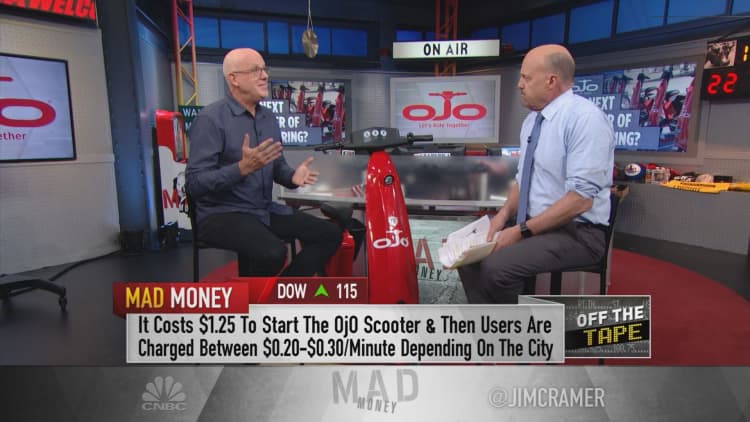
Electric scooters are not only changing how people move around cities, but they can also disrupt the way things are delivered, OjO Electric CEO Max Smith told CNBC's Jim Cramer on Monday.
"We think it's a really big market not only for moving people safely, sustainably around the city, but this scooter is really designed to deliver food, to do parcels, to do packages," Smith said on "Mad Money."
"So that entire mobility space and the delivery of products and services and food is an explosive market, and we're seeing that. "
OjO is jumping into the crowded landscape of electric scooters as the two-wheeled machines shake up transportation networks in cities around the country, many of which are dealing with rising car and truck congestion.
Scooter companies are attracting bushels of venture capital, with investors looking to grab a slice of the $7 trillion mobility market. But the disruption is sometimes creating headaches for city governments — and, in a way, for emergency rooms — as they grapple with how to regulate the scooters.
OjO has its rideshare scooters available in two cities in Texas, Austin and Dallas, as well as in Memphis, Tennessee. It also ran a pilot program in Hoboken, New Jersey.
But OjO is different than big players such as Bird and Lime, Smith noted, because its scooters have a seat, making them look more like a moped's younger cousin than a suped-up Razor.
Revel, another competitor, is a moped-sharing company operating in Brooklyn and Queens, plus Austin and Washington, D.C.
Smith said OjO has designated drop-off spots for the scooters, which the company markets as suitable for bike lanes. Riders could leave the scooters, which have a maximum speed of 20 mph, somewhere else but they will pay a fine, Smith said.
Smith told Cramer that OjO's scooter was specifically designed to differentiate itself from some of its rivals, arguing that the seated design provided a more comfortable and accessible ride.
"We're excited about the product we built," Smith said.
That design is also what opens the door to the scooter being used for food and product delivery, Smith said.
Smith said OjO has a delivery pilot underway that has, so far, been largely successful. It is unclear in which city — or with which company — the pilot is happening.
"They're reporting in excess of 30% more efficient deliveries using the scooter," Smith said, asserting it's better than both cars and bikes. "The average rider right now, the delivery person, is doing 35 miles a day. There are some doing 50, 60 miles a day. That's more trips, more tips."
Improving the efficiency of deliveries is what everyone wants, Smith argued, especially in the increasingly competitive food transportation market. Pizza chain Domino's, for example, is experimenting with e-bike delivery.
Smith said the scooters can help get food to its destination "on time, and it's still warm."
"That's the opportunity," Smith said.

Questions for Cramer?
Call Cramer: 1-800-743-CNBC
Want to take a deep dive into Cramer's world? Hit him up!
Mad Money Twitter - Jim Cramer Twitter - Facebook - Instagram
Questions, comments, suggestions for the "Mad Money" website? madcap@cnbc.com



